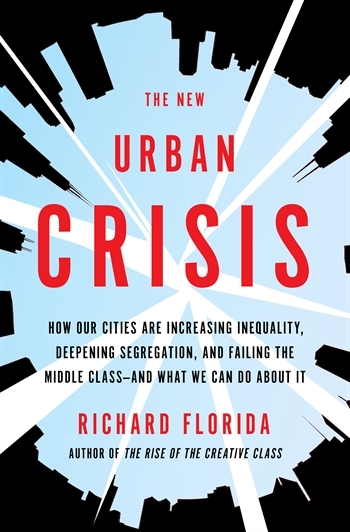
Richard Florida captivated the audience with a hard-hitting discussion on the growing inequality in cities across the world.
How has the economic growth of cities increased inequity? How can cities both strengthen our economies and support all communities, not just the affluent? The provocative and sometimes-controversial thought leader Richard Florida explores these questions in his new book, The New Urban Crisis, which he discussed at Metropolitan Planning Council’s June 9 Roundtable to an audience of more than 150 people.
Florida, who is the son of a factory worker and grew up in New York City and New Jersey, reflected on the changing landscape of cities both from a personal perspective and through his research. An accomplished urbanist and author, Florida rose to prominence with his book The Rise of the Creative Class, which postured that the 40 million American workers he calls the “creative class”—artists, scientists and other innovators—are the greatest force driving the economy and reviving U.S. cities. However, he soon realized that the urban revival he once championed was in fact contributing to increased inequality.
Historically, the driving force of economic decline was the middle class leaving cities for the suburbs. But Florida argues that the urban “creative class” is not sharing their wealth growth and that the middle class is shrinking. In fact, across nearly every metro area, middle-class neighborhoods are disappearing. Our cities and suburbs are being replaced by a patchwork metropolis, according to Florida, in which vast swaths of poverty and disadvantage surround small areas of privilege. Cities that boast substantial innovation and creative sectors also suffer great economic inequality; despite the clustering of talent and economic assets in cities, these resources are not shared by everyone, only by the privileged. Florida argues that segregation and concentrated poverty drive economic inequality more than displacement and gentrification.

Segregation locks people and neighborhoods in place: the poor stay poor and the rich stay rich. And as our Cost of Segregation study found, these forces most deeply impact communities of color in Chicago. We found that if African American-white levels of segregation lowered to the national median, incomes for African Americans in the Chicago region would rise by approximately $2,892 per year. Our region’s gross domestic product would also rise by approximately $8 billion.
To address urban economic inequality—the result of policy choices such as reductions in taxes and welfare benefits, anti-union measures and discriminatory lending practices—Florida argues that we must devise a new model of urbanism that encourages innovation and wealth creation while generating good jobs, rising living standards and a better life for everyone. He urges cities to break down the barriers separating rich from poor and to rebuild the middle class by investing in infrastructure, building more housing, reforming zoning and tax laws and developing a new national urban policy.
Florida was quick to note, however, that federal policies and the Trump Administration will likely not be allies in urban revitalization and equity in the coming years. It is up to the cities themselves—and the business, civic and activist leaders within them—to rebuild cities with a focus on equity. If the Florida’s large June 9 audience is any indication, it’s clear that MPC and other leaders in Chicago are eager and willing to tackle inequity and build a region that works for all of us.
MPC thanks King and Caryn Harris and Matt and Lucy Moog for their generous sponsorship of this event.
Join Us
MPC frequently hosts events to stimulate conversation on how to make our region more sustainable and equitable for everyone. Learn more about our exciting lineup of upcoming events.